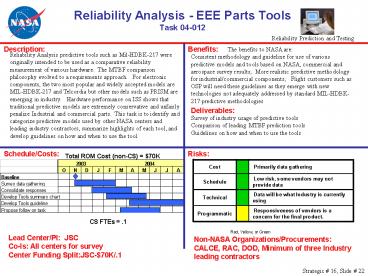Reliability Analysis - EEE Parts Tools Task 04-012 - PowerPoint PPT Presentation
1 / 1
Title:
Reliability Analysis - EEE Parts Tools Task 04-012
Description:
For electronic components, the two most popular and widely accepted models are ... methodology for industrial/commercial components; Flight customers such as OSP ... – PowerPoint PPT presentation
Number of Views:19
Avg rating:3.0/5.0
Title: Reliability Analysis - EEE Parts Tools Task 04-012
1
Reliability Analysis - EEE Parts ToolsTask 04-012
Reliability Prediction and Testing
Description
Benefits
The benefits to NASA are Consistent methodology
and guideline for use of various predictive
models and tools based on NASA, commercial and
aerospace survey results More realistic
predictive methodology for industrial/commercial
components Flight customers such as OSP will
need these guidelines as they emerge with new
technologies not adequately addressed by standard
MIL-HDBK-217 predictive methodologies
Reliability Analysis predictive tools such as
Mil-HDBK-217 were originally intended to be used
as a comparative reliability measurement of
various hardware. The MTBF comparison philosophy
evolved to a requirements approach. For
electronic components, the two most popular and
widely accepted models are MIL-HDBK-217 and
Telcordia but other models such as PRISM are
emerging in industry. Hardware performance on
ISS shows that traditional predictive models are
extremely conservative and unfairly penalize
Industrial and commercial parts. This task is to
identify and categorize predictive models used by
other NASA centers and leading industry
contractors, summarize highlights of each tool,
and develop guidelines on how and when to use the
tool.
Deliverables
Survey of industry usage of predictive
tools Comparison of leading MTBF prediction
tools Guidelines on how and when to use the tools
Schedule/Costs
Risks
Total ROM Cost (non-CS) 70K
Cost Primarily data gathering
Schedule Low risk, some vendors may not provide data
Technical Data will be what Industry is currently using
Programmatic Responsiveness of vendors is a concern for the final product.
CS FTEs .1
Red, Yellow, or Green
Lead Center/PI JSC Co-Is All centers for
survey Center Funding SplitJSC-70K/.1
Non-NASA Organizations/Procurements CALCE, RAC,
DOD, Minimum of three Industry leading contractors
Strategic 16, Slide 22































